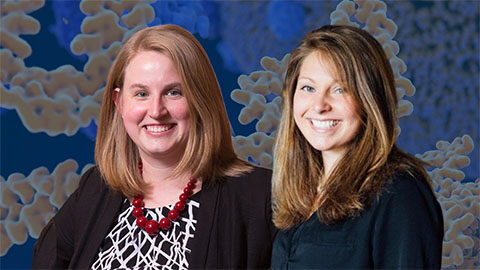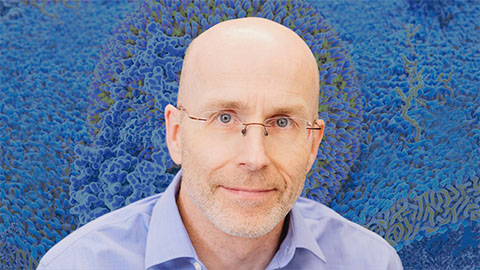Toker recognized for ‘seminal contributions’ to lipid biology
Alex Toker always has been interested in science, and he recalls many days spent at the Natural History Museum in London, where he grew up. Yet it wasn’t until his postdoctoral years spent under the mentorship of Lewis Cantley that he decided to make research his career.

“I just had kind of an epiphany and decided this is what I want to do for the rest of my life,” Toker said. “I loved basic science and discovering things.”
In 1988, Cantley won the American Society for Biochemistry and Molecular Biology’s Avanti Award in Lipids. Toker, now a professor at Harvard Medical School and editor-in-chief of the Journal of Biological Chemistry, will receive the same award in 2022. Toker is being recognized for his work on lipid signaling and particularly his studies on phosphatidylinositol 3-OH kinase, or PI3K, and serine/threonine kinase AKT signaling in cancer.
Vytas Bankaitis, a distinguished professor and chair in chemistry at Texas A&M University and winner of the 2019 Avanti Award, wrote in his nomination letter that Toker deserved the award for his “seminal contributions to the lipid field” and “steadfast professionalism.” Toker received word about the award while on vacation in New Hampshire.
“I was just so proud and ecstatic and filled with a sense of achievement and recognition by my peers,” Toker said. “It really is a culmination of 20-plus years of running a laboratory, and, considering the past recipients, it is truly humbling.”
The discovery aspect of research still drives him, and he enjoys the independence and creativity scientific research can bring. He is also passionate about mentoring.
“The greatest source of joy and pride and the most satisfying aspect of my career is really the training of the scientists and students that I’ve had in my laboratory,” he said.
Toker credits his family, trainees, mentors and colleagues with helping get to where he is today.
Pathways past and future
Alex Toker’s research focuses on understanding how intracellular signaling pathways affect cancer cell behavior. During his postdoc work, he identified that a protein kinase called Akt, also known as protein kinase B, or PKB, was activated by lipid products of the PI3K pathway, thus linking the two signaling pathways.
The two pathways, together with the mammalian target of rapamycin, or mTOR, pathway, collectively control cellular metabolism, proliferation and growth, and survival. All are dysregulated in certain types of cancer.
In his award talk, Toker plans to start at his seminal discovery linking lipid mediators with specific signaling and move through his subsequent work characterizing Akt and other pathways in the cell and in cancer. He also will focus on where he thinks the field is going and ongoing studies in his lab aimed at designing therapeutic interventions targeting the pathway.
2022 ASBMB award winners
Lea Michel, ASBMB Early Career Leadership Award
Marlene Belfort, ASBMB Mid-Career Leadership Award
Michael Airola, Walter A. Shaw Young Investigator Award in Lipid Research
Tatyana Sharpee, Delano Award for Computational Biosciences
Tracy Johnson, Ruth Kisrchstein Diversity in Science Award
Martin Bollinger, William C. Rose Award
Joe Provost, ASBMB Award for Exemplary Contributions to Education
Walther and Robert Farese Jr., ASBMB–Merck Award
Greg Wang, ASBMB Young Investigator Award
Janet Smith, Mildred Cohn Award
Kathleen Collins, Earl and Thressa Stadtman Distinguished Scientist Award
Elaine Fuchs, Bert and Natalie Vallee Award in Biomedical Science
Susan Taylor, Herbert Tabor Research Award
John Boothroyd, Alice and C.C. Wang Award in Molecular Parasitology
Enjoy reading ASBMB Today?
Become a member to receive the print edition four times a year and the digital edition monthly.
Learn moreGet the latest from ASBMB Today
Enter your email address, and we’ll send you a weekly email with recent articles, interviews and more.
Latest in People
People highlights or most popular articles

Redefining lipid biology from droplets to ferroptosis
James Olzmann will receive the ASBMB Avanti Award in Lipids at the ASBMB Annual Meeting, March 7–10, just outside of Washington, D.C.

Creating change in biochemistry education
Pamela Mertz will receive the ASBMB William C. Rose Award for Exemplary Contributions to Education at the ASBMB Annual Meeting, March 7-10 in Washington, D.C.

Amacher, Pollock named Henry Dreyfus scholars
They were recognized for their outstanding research scholarship and a deep commitment to undergraduate education and each received $75,000 to fund their research.

Trainee mentorship as immortality
Suzanne Barbour will receive the ASBMB Sustained Leadership Award at the ASBMB Annual Meeting, March 7-10 in Washington, D.C.

Life in four dimensions: When biology outpaces the brain
Nobel laureate Eric Betzig will discuss his research on information transfer in biology from proteins to organisms at the 2026 ASBMB Annual Meeting.

Fasting, fat and the molecular switches that keep us alive
Nutritional biochemist and JLR AE Sander Kersten has spent decades uncovering how the body adapts to fasting. His discoveries on lipid metabolism and gene regulation reveal how our ancient survival mechanisms may hold keys to modern metabolic health.

